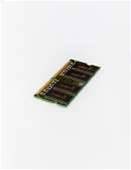
Patriot Memory said that it will be featuring working displays of the 1302MHz Extreme Performance PC2-10100 module.
The models are over-clocked DDR-2 modules. DDR-2 chips normally operate at speeds of 667-800MHz.
Although Patriot's new modules may be the fastest, the act of over-clocking a memory module is hardly a technological breakthrough, according to Nam Hyung-Kim, director and principal analyst at research firm iSuppli.
"I do not think this is very meaningful to the market," said Kim. "It is not that difficult for normal module vendors to make modules with over-clocking."
The analyst added that, while the Patriot modules could provide users, particularly gamers, with a speed boost, it will come at a price.
Over-clocked memory tends to cost more than plain Ram, and the over-clocking will cause the chips to produce more heat.
Comparable memory modules, such as Corsair's 1111MHz DHX Dominator modules, retail at around US$400 and generate so much heat that the modules require specially crafted heat-sinks and three 40mm fans.
In a September review of the Corsair DHX Dominator, Tom's Hardware found that the high-end Corsair models provided little performance boost over conventional memory modules in the areas of game performance, audio encoding, and 3D rendering, where graphics card and processor performance take precedence over memory speed.
"Deploying a faster processor or a more powerful graphics solution will usually give you a better bang for the buck than the highest-end memory product," the site concluded.

.png&h=140&w=231&c=1&s=0)
_(36).jpg&h=140&w=231&c=1&s=0)

_(33).jpg&h=140&w=231&c=1&s=0)





 iTnews Executive Retreat - Security Leaders Edition
iTnews Executive Retreat - Security Leaders Edition
 iTnews Cloud Covered Breakfast Summit
iTnews Cloud Covered Breakfast Summit
 Melbourne Cloud & Datacenter Convention 2026
Melbourne Cloud & Datacenter Convention 2026
 The 2026 iAwards
The 2026 iAwards












_(1).jpg&h=140&w=231&c=1&s=0)



